As tens of thousands return to the streets for the first national Palestine march of 2026, this movement refuses to be sidelined or silenced, says PETER LEARY
How to care for your cabbages over winter
Gardening with MAT COWARD

 Cabbage leaves
[William Warby/Creative Commons]
Cabbage leaves
[William Warby/Creative Commons]
THERE’S no such species as the cabbage white butterfly, though you wouldn’t know it from my garden where any brassicas left uncovered during the summer soon have their leaves skeletonised by caterpillars.
There are in fact two species, the large white and the small white, whose larvae cause such annoyance to veg growers.
By October these butterflies are disappearing from gardens, so there are no more eggs being laid on cabbages, purple sprouting broccoli, kale and the rest.
Similar stories

MAT COWARD presents a peculiar cabbage that will only do its bodybuilding once the summer dies down

MAT COWARD rises over such semantics to offer step by step, fool-proof cultivating tips

It’s a dead easy crop to grow and can be made into one of Britain’s best sauces. MAT COWARD explains how

MAT COWARD battles wayward pigeons in pursuit of a crop of purple sprouting broccoli










